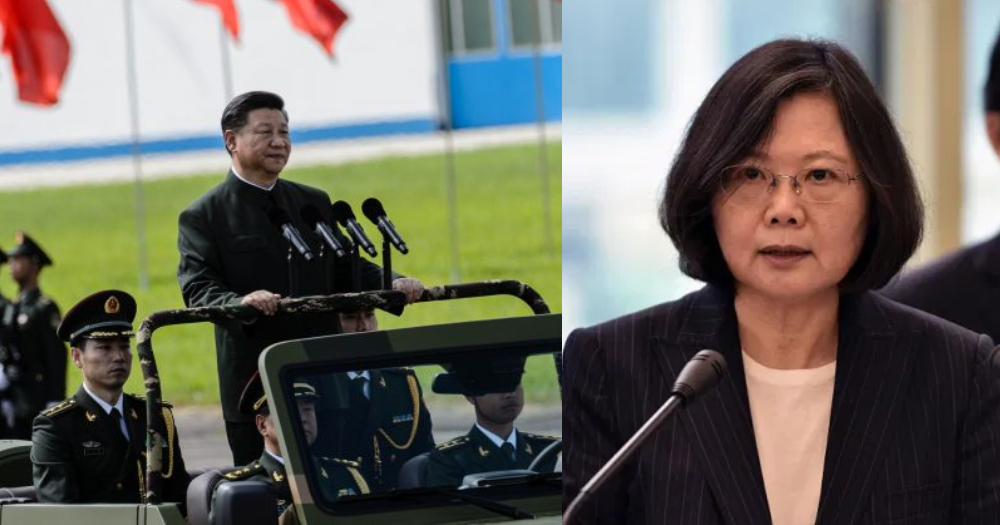In a number of overseas manoeuvres in the last few months, China has flexed its military might in the region as it comes out of the shadows that the Covid-19 pandemic had briefly cast on the nation.
Chest-thumping nationalism
It flew fighter jets into Taiwan’s airspace, scuffled with Indian soldiers along the Himalayan border, and passed a national security law in Hong Kong that will allow its security agencies to operate in the territory directly.
Such exploits have received considerable support on Chinese social media, where nationalistic voices tend to be amplified.
While these views do not necessarily represent the majority of the Chinese population, they were allowed to grow after the reelection of Taiwanese President Tsai Ing-wen in January 2020.
This is because these nationalistic sentiments fit with the Chinese government’s goal of ramping up its pressure on the ruling Democratic Progressive Party that leans towards independence.
In stoking nationalism, the government can also divert their attention sufficiently from bread-and-butter issues that the people are concerned with, such as rising unemployment due to the Covid-19 induced economic slowdown.
High expectations might not match the reality
Nationalism, if left unchecked, can backfire on the government, especially if it is seen as not being assertive enough when it comes to protecting China’s interests, or if it leads to greater international conflicts.
While a tweet by the general manager of the NBA team Houston Rockets drew the ire of many mainland Chinese basketball fans due to his support for the Hong Kong protests, Chinese authorities later reined in the nationalistic backlash when it threatened to grow into something akin to organised action.
Jingoistic calls to invade Taiwan can also create overly ambitious expectations of the country’s military, which might not be all that invincible as they thought, LA Times wrote.
While Chinese nationalists calling for Taiwan’s invasion might be confident in China’s growing military might, the quest is not a guaranteed success for the People’s Liberation Army (PLA).
This is due to several reasons, one of which is Taiwan’s natural terrain, which makes it hard for invading forces to land on the island and advance successfully.
Taking Taiwan by force will not be easy
Not only do hundreds of thousands of Chinese troops have to contend with the limited number of reliable landing beaches, which is only 13 on the western coast, they would have to traverse the mountainous regions to reach the capital of Taipei, according to CNN.
And that’s not to mention the task of launching a large-scale amphibious invasion, which is said to be one of the most complicated and difficult military operations.
The sheer scale of the operations would also make it impossible to spring a strategic surprise on Taiwan, giving the island ample time to prepare for its defence and retaliation, Foreign Policy writes.
Furthermore, with 70 years of preparation for war with the PLA under its belt -- the Chinese Communist Party (CCP) has not ruled out the use of force to reunify Taiwan with the mainland -- the task of taking Taiwan by force appears to be far from a walk in the park.
But as China’s military modernisation continues, Taiwan’s advantages could decline.
While it can be hard to predict if such an operation succeeds, Drew Thompson, a former U.S. Defence Department official and a visiting research fellow at the Lee Kuan Yew School of Public Policy told LA Times that a Taiwan conflict would certainly be "horrendous".
He said war between the two "would not be quick and easy, but a disaster".
Chinese taking it down a notch?
So while nationalism is allowed to grow among the people should it fit the Party's purpose, it might not be exactly beneficial to Beijing for such sentiments to get out of hand when it comes to calls to invade Taiwan, in view of the drawbacks.
This might be why more moderate voices have emerged, amid the ones calling for China to "smash any separatist plots or actions" in Taiwan.
Retired PLA Air Force major general Qiao Liang warned that "the Taiwan problem cannot be solved with rashness and radicalism", Taipei Times reported.
He also cautioned against nationalism as it could "harm the country", and in particular, single out voices calling for the country to make use of the pandemic to invade Taiwan.
His warning is notable as he is known for his hawkish views, having published a book in 1999 on defeating the U.S. through unconventional means.
Most Chinese still more concerned about bread-and-butter issues
But it is worth noting that such opinions do not necessarily translate to the public's desire for war, especially when pit against more pressing day-to-day issues.
According to a survey administered to 1,485 Chinese respondents conducted by the University of Hong Kong in 2016, more Chinese preferred domestic goals, such as reducing income disparity (12 percentage points) over increasing military strength.
Most respondents (69.7 per cent) also agreed that war avoidance should be the overarching goal of Chinese foreign policy.
Nationalism pushes Taiwan further away
However, this does not mean that Beijing has ceased its posturing, since for one, Taiwan is seen as one of its "core" interests that are non-negotiable.
Chinese fighter jets have routinely approached Taiwan as a show of force.
But if past events are anything to go by, the more forceful the Chinese are in their approach to Taiwan, the further they end up pushing the island away from its fold.
Chinese pressure on Taiwan to isolate it diplomatically on the international stage, as well as growing belligerence in its rhetoric towards Taiwan after Tsai took office and refused to reaffirm the "One China" policy, have arguably handed the leader her reelection victory.
Top image adapted via Getty Images
If you like what you read, follow us on Facebook, Instagram, Twitter and Telegram to get the latest updates.
